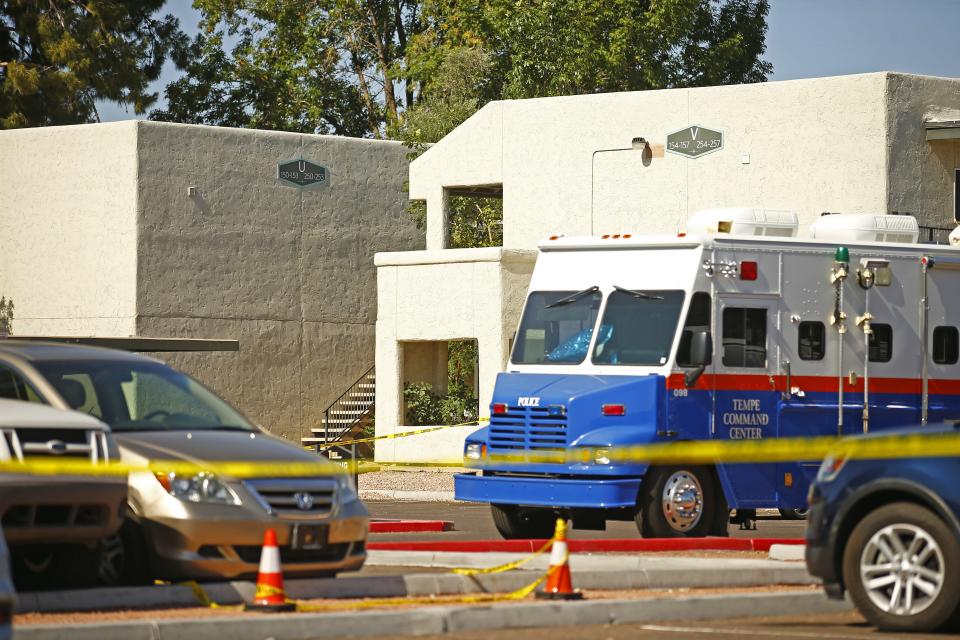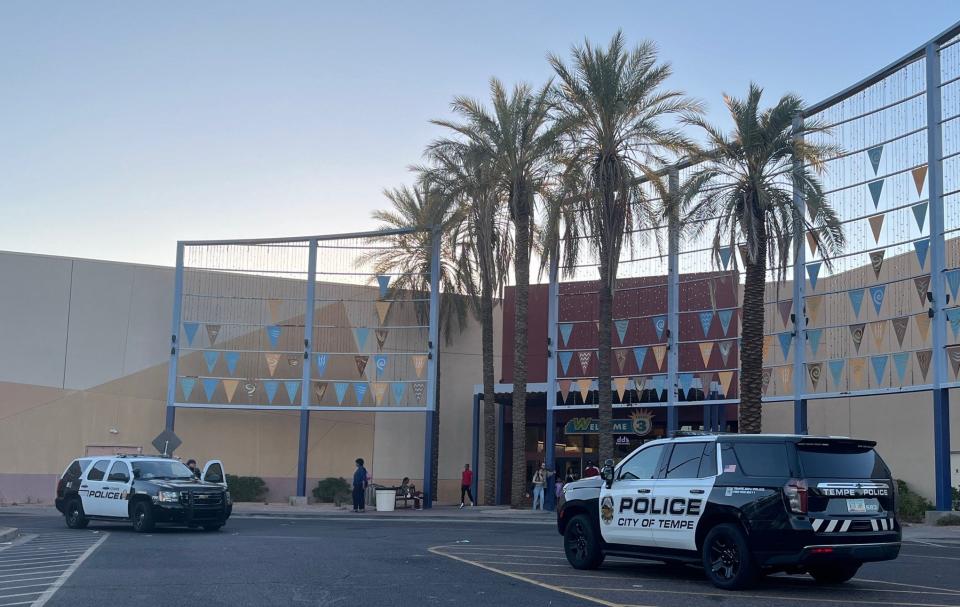Murder, rape cases in Tempe could be in jeopardy over inconsistent crime scene work
- Oops!Something went wrong.Please try again later.
The Tempe Police Department is reviewing every serious investigation from the past three years and paying a neighboring city to collect crime scene evidence until it can improve and standardize its collection of forensic evidence.
Tempe police Chief Kenneth McCoy said the review of the forensics unit was prompted when a new, experienced forensic supervisor took over in January and identified what he called "a need for improvement." She determined that the unit inconsistently gathered evidence and needed its standards "elevated," McCoy said.
In July, Tempe halted its team of six crime scene investigators from collecting evidence in serious cases, including murders and rapes. Technicians collect DNA, fingerprints and other forensic evidence from crime scenes for analysis, which can be critical later in court in convincing juries of a defendant's guilt.
It remains unclear how many cases could be affected, and city officials haven't said. But the team's collection of forensics could complicate dozens of serious cases and potentially could put some in jeopardy.
How many Tempe criminal cases are affected?
Tempe has referred nearly 9,000 cases to the Maricopa County Attorney's Office since January 2020, according to data from the prosecutors' office.
According to the County Attorney's Office, between Jan. 1, 2020, and Sept. 25, 2023, Tempe submitted 60 cases with a charge of first-degree murder, second-degree murder, negligent homicide or manslaughter, plus 57 more cases involving sexual assault charges.
Tempe officials confirmed that their forensic technicians also respond to aggravated assaults, and, according to the prosecutors' office, referred 1,403 such cases. It's not clear how many of those cases required the forensic unit's work.

Why Tempe police is retraining its forensic unit
The level of certification alone, even though it's not legally required for technicians, could allow defense attorneys to poke holes in the forensic evidence in a case or, if a judge agrees, block juries from seeing it. If a judge rules that the forensics used in some of Tempe's closed cases was not valid or reliable enough to be admitted as evidence, those convictions could be imperiled.
"It can go to the qualifications to perform the tasks. It can affect their qualifications as an expert in the field. It can affect the reliability of the scientific results — or the jury's willingness to accept the results,” Phoenix-based attorney Rhonda Elaine Neff told The Arizona Republic. “It can affect whether the state is able to pass the evidentiary standards for admission of the evidence in a case pretrial or at trial."
McCoy said Tempe police decided to retrain the forensic unit to establish consistent, higher standards.
Department leaders decided the technicians need to be certified as experts at Mesa’s forensics academy before resuming work on Tempe's most serious crime scenes. City officials did not say what certifications team members have. The Mesa certification typically takes about eight months, but Tempe officials did not clarify if the new training has begun.
Meanwhile, Tempe will outsource forensic work on major crime cases to the Mesa Police Department. It’s part of an informal agreement that's been in place for about two months. Once the deal is made official, it’s expected to cost Tempe roughly $170,000.
Meanwhile, Tempe is going through three years of closed police cases, looking for any potential pitfalls in how forensic evidence for them was collected.
More: The first police officer to ever compete in Miss USA is a Tempe resident
Tempe police saw 'a need for improvement'
For now, city officials said they were not worried.
They would not specify how many of those closed cases were being analyzed as part of the ongoing review, but McCoy said the department so far has "found no cases that have been impacted."
McCoy also said he pulled the unit off major crimes not to find fault, but rather "out of an abundance of caution," and to bide time for the unit to get certified and flesh out its operating guidelines.
"The unit has done nothing wrong. This was all borne out of us bringing on board a new forensic services supervisor," the chief said. "She identified a need for improvement to get (the unit) at a level to where everyone is operating consistently."

McCoy said the new supervisor noticed the team's operating procedures, methods of collecting and processing evidence and training were inconsistent.
McCoy said each technician went through different courses and on-the-job training through the years. He said he believed they all were qualified to do the job despite their lack of expert certifications.
Tempe spokesperson Kris Baxter-Ging wrote in email that "all the team members of the FSU (Forensic Science Unit) have done quality work," regardless of any inconsistencies.
Each technician has received on-the-job training and have taken multiple courses on topics that include, "evidence technology, evidence collection, the processing of crime and accident scenes, and fingerprint and biological evidence identification," according to Baxter-Ging. Three of them also have related college degrees.
"It was important for (the forensic unit's leadership) to ensure that all of the members of the unit had that appropriate level of baseline training, and that there were good policies and protocols in place to ensure everyone was operating on the same sheet of music," McCoy said.
Still, that consistency of work and the quality of certification matters in criminal court. The extent varies by case, depending on the strength and significance of forensic evidence and the totality of the evidence.
Prosecutors explain the impact on cases
Federal public defender Cary Sandman explained that even if forensic evidence or the testimony of forensic technicians were thrown out, cases with other rock-solid evidence, such as eyewitness testimony or confession, might be largely unaffected.
"If, apart from the crime scene evidence, the state had other substantial evidence of guilt, that might undermine the impeachment of a single uncertified witness," Sandman said. He added that the absence of certification was context-driven and case-specific in how it could shape the outcome of a trial.
Experts also emphasized that prosecutors have a constitutional obligation to notify defense lawyers if they find evidence that could help them argue the innocence of their clients.
That legal principle was established by the U.S. Supreme Court in its landmark ruling on Brady v. Maryland. Trial court judges have thrown out cases after finding out that prosecutors withheld such exculpatory evidence from defense teams. Prosecutors can face disciplinary sanctions for misconduct involving failure to disclose Brady evidence.
This lies at the heart of why Tempe chose to review old cases. The review might identify in advance, rather than after the fact, any potential Brady problems that could complicate a prosecution.
Rich Robertson, a private investigator who specializes in criminal defense, also said Tempe should act quickly to make things right if police uncover forensic evidence that was questionable or could be challenged in court. And cleaning up that mess could involve re-launching investigations into specific crimes.
"If there are cases that the outcomes may have been affected by these lower standards. … I think it's incumbent upon the police department and the County Attorney's Office to work on the case to revisit those cases," he said.
In response to The Republic's questions about whether prosecutors were aware of Tempe's review process, a spokesperson for the County Attorney's Office responded by email: "At this time, the Maricopa County Attorney’s Office is following up with Tempe police to determine if any action is needed on our part."
Reporter Sam Kmack covers Tempe, Scottsdale and Chandler. Follow him on Twitter @KmackSam or reach him at sam.kmack@arizonarepublic.com.
Reporter Elena Santa Cruz covers Mesa, Tempe, and Glendale police. Reach her at elena.santacruz@gannett.com
This article originally appeared on Arizona Republic: Tempe police asks Mesa to process crime scenes: Here's why

